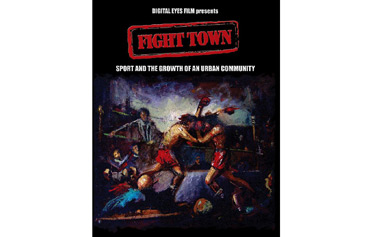My first destination in the Pioneer Valley, circa 1995, was a storage place in downtown Holyoke. After all I’d read about the area that was to be my new home, I was surprised at how little I saw of the bucolic splendor I’d heard about. Instead, I was greeted by a brand of more urban-flavored decay I was no stranger to, a decay defined by weed-split pavement, boarded-up buildings and layer upon layer of graffiti.
Soon I was told by new friends that Holyoke was very much its own place, defined by a history different from the white-tower rarefication of its cousins just to the north. My travels didn’t take me back to Holyoke much after that first foray, but I eventually learned that Holyoke is indeed a place with a proud history all its own, one that rewards closer examination.
One particularly important aspect of that history—sport—is the subject of filmmaker (and Holyoke native) P.J. Moynihan’s Fight Town, a documentary he originally made in 2004, but recently re-edited for broadcast on WGBY July 31. The new version features Moynihan’s voiceover and a soundtrack including works by Star Drooker (who was the subject of a film he co-produced with Moynihan called Salmonboy), David Spelber, Jose Gonzalez and The Black Velvet Band. Fight Town is shot on video and full of local talking heads. Moynihan does a good job of putting together the available elements, propelling his tale of Holyoke at a good pace and peppering it with still photos new and old, short interludes of text, and more recent moving footage of sporting events. Especially given that Moynihan worked with a palette limited by the availability of old film footage, Fight Town taps a rich vein of unexpected history.
If the idea of viewing local history through sport also sounds limiting at first blush, fear not: by talking to people who participated in and witnessed sporting events of years ago, Moynihan turns up colorful tales about everything from sneaking up fire escapes to get into events to witnessing a seconds-long Mike Tyson bout in Holyoke. For those who grew up in the area, the film may be full of the expected. But for an outsider like me, even though I come from the football-mad Lone Star State, Fight Town offers a surprising look at one of the phenomena that fosters the sometimes stout devotion to their city that many Holyoke natives possess: old rivalries and expressions of solidarity through sport, in good times and bad. The city has legitimate claim to some big-time sports history to boot.
Even in non-sports terms, Holyoke’s history can be surprising. Moynihan explains that Holyoke was “the United States’ first master-planned industrial city,” and became a patchwork of neighborhoods containing factory workers of most every stripe and ethnicity. One interviewee compares it to Brooklyn (if on a smaller scale), and indeed, old images bolster that notion. Its nickname, “Paper City,” arose from the predominance of paper mills among the city’s many incarnations of industry.
Neighborhood and school rivalries lend themselves quite handily to sport, of course, and Moynihan begins his exploration of sport’s importance by noting that the man who invented stadium lighting first mounted his lights on poles in Holyoke to foster evening baseball games.
That seems emblematic: Holyoke seems to have taken the idea of sport pretty seriously. The invention of volleyball happened at the YMCA in the late 19th century, and it promptly became internationally known. A good few minutes of Fight Town take on another interesting historical notion, that basketball my well have been played in Holyoke before it caught on just down the road in Springfield. Even a Basketball Hall of Fame historian says it might have happened that way.
Holyoke was also the scene of early fights by the likes of Rocky Marciano and Mike Tyson, and produced a healthy list of professional baseball players. Moynihan’s film offers a large dose of the kind of information that creates a sense of place, a sense of history that illuminates the present.
Holyoke still takes sports seriously. Head to a Holyoke Blue Sox game sometime, and you get a sense of community that you might have thought only existed in the minds of the nostalgia-prone. The trappings of the present don’t impede the sense that neighbors chatting and kids running around with gloves to go after fouls are time-honored traditions. Fight Town offers a look at where that present came from.
Check out Fight Town at fighttownmovie.com.



